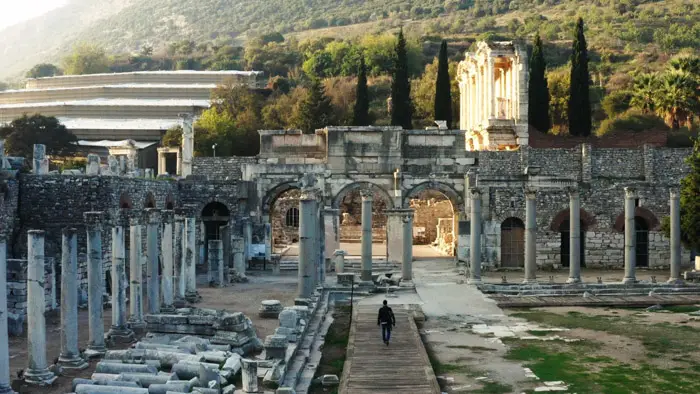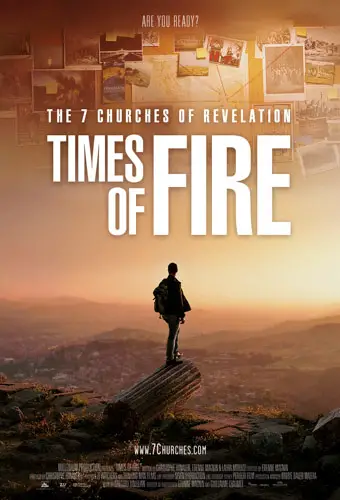
If you ask some of my more religious friends and family, they’ll tell you that we are close to the final days as described in the Book of Revelation. Then again, they’ve told me that year after year for years. Either way, Revelation has inspired so many stories of the apocalypse, but what exactly does the last book of the Bible say? Timothy Mahoney’s documentary, The 7 Churches of Revelation: Times of Fire, stars investigative filmmaker Christophe Hanauer as he visits the locations and origins surrounding Revelation.
Hanauer’s journey first takes us to the Island of Patmos, where John, the last surviving member of Jesus’ disciples, is living in exile by the Roman empire. His eleven cohorts were all murdered or executed for spreading the message of Christ. Next, Hanauer presents the church that exists in honor of the Apostle John, the art and artifact that tells John’s story, and the Biblical library that holds some of the oldest manuscripts of the Bible.
If you’re not familiar with the book of Revelation, while on Patmos, John experiences several vivid dreams of the end times and documents the final days before the return of Jesus Christ. Along with the dream, John writes seven letters to the seven early churches formed by the Paul, and the other apostles, warning/encouraging them to stay on course and stay pure. In hopes of illuminating these letters, Hanauer then visits the churches—all located in Turkdey—as they exist today.

“…seven letters to the seven early churches… warning/encouraging them to stay on course and stay pure.”
This review is for part one of the 7 Churches series as Hanauer visits the churches of Ephesus, Smyrna, and Pergamos. John wrote to Ephesus to warn them against false teaching and paganism. To Smyrna, John warns that the church will soon face tough times, and they will be persecuted for their faith. Finally, John encouraged the church of Pergamos as they were a strong, growing church, but warned to not dilute or compromise their faith with paganism.
In terms of historical lessons, Hanauer talks about the persecution the early church experienced as Christians were forced to renounce their faith in Jesus Christ or face death. The biggest culprit of these murders was the Roman Empire. Then there’s Nero, who burnt Rome to the ground (while he fiddled) to rebuild it into a more glorious empire. He would blame the Christians for the fire. Also, local merchants selling their idols became fearful that these new Christians would negatively impact their business and had many arrested and imprisoned.
The 7 Churches of Revelation: Times of Fire reminds me of these Holy Land (Israel) tours, giving many the chance to walk the footsteps of Jesus himself. Hanauer’s travels take audiences to the actual locations of Revelation to make a physical connection with the ancient text with its actual locations. The production values are top-notch with a stirring soundtrack. The film’s tone is academic in nature, presenting facts and history from a decidedly Christian perspective. As you’d expect, the information is presented as fact, so take it for what you will.
I’ve written a great deal about my Christian background and found the information and Hanauer’s presentation fascinating. There’s a lot of information presented, and the history has a Sunday sermon feel to it at times. As a film, The 7 Churches of Revelation: Times of Fire is a must-see if you’re a fan of historical documentaries or what to get more out of your daily Bible reading. Otherwise, it can feel dry as “hell.”
The 7 Churches of Revelation: Times of Fire will screen for two days through Fathom Events.

"…take audiences to the actual locations of Revelation to make a physical connection with the ancient text..."

[…] post The 7 Churches of Revelation: Times of Fire first appeared on Film […]